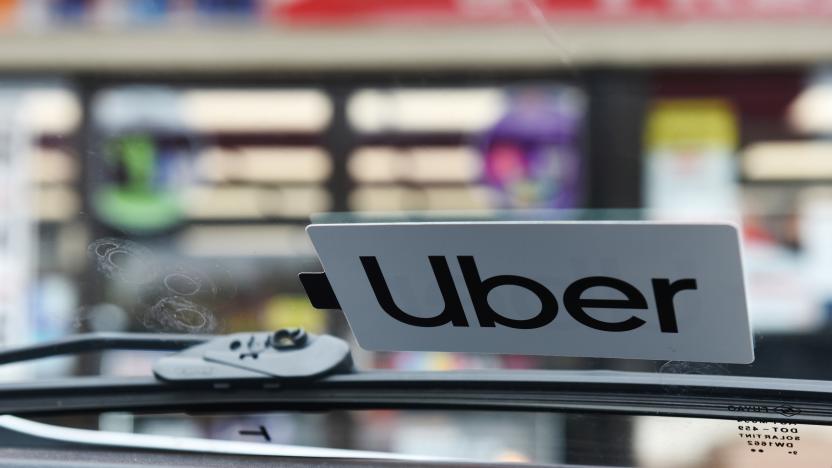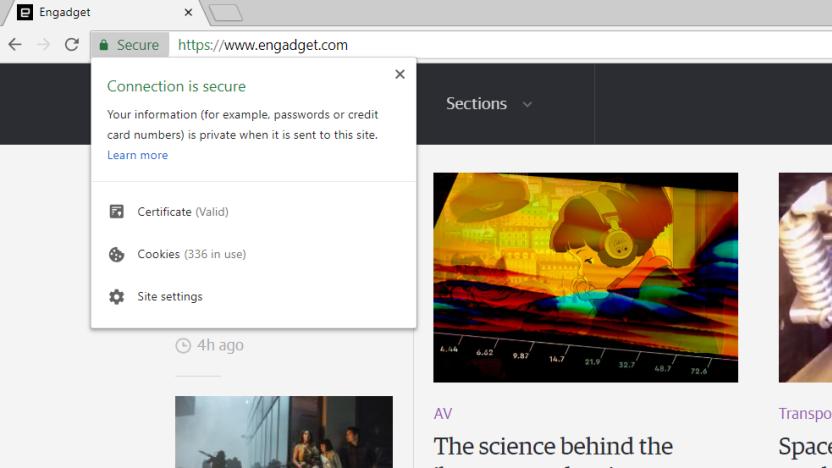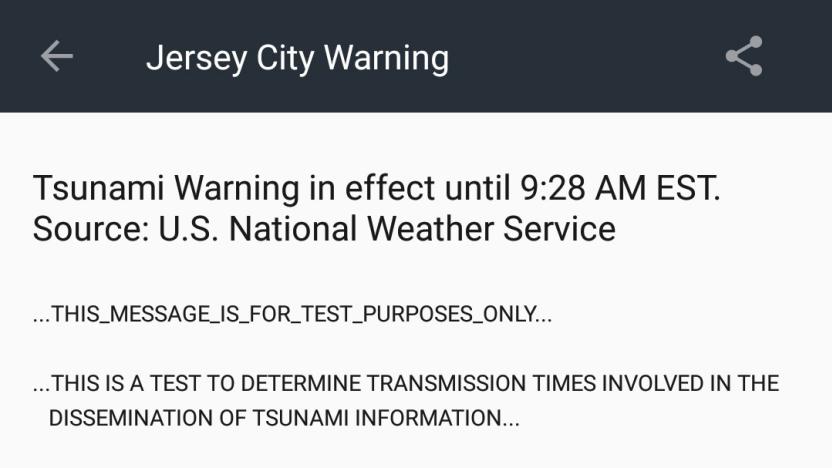alert
Latest

Uber's audio recording safety feature is coming to the US
Other new measures include audible seat belt alerts and RideCheck enhancements.

Tesla warns California customers to charge their EVs ahead of outages
With dry weather and windy conditions on the horizon, California's Pacific Gas & Electric (PG&E) utility is planning a mass power outage to prevent electricity lines from sparking wildfires. That could be bad news for electric vehicle owners, so Tesla is taking a proactive approach. The company issued an in-car alert warning owners to charge their vehicles fully ahead of the outage. Tesla is also activating the 'Storm Watch' feature on its PowerWall to store excess electricity before the lights go out.

Facebook's local alerts will be available across the US
Facebook's local government alerts could soon be an everyday reality for American users. The social network is expanding access to all eligible Pages in the US by the end of 2019, giving authorities across the country a way to spread urgent info. As before, officials and emergency teams can mark a post as a local alert and ensure that you'll see it if you're in an affected area. If there's dangerous weather or a bomb threat, you'll hear about it on Facebook right away.

FEMA's next Emergency Alert System test leaves internet devices out
Federal agencies are once again poised to test emergency alerts, but this time it's all about where you won't see them. The FCC and FEMA are conducting their fifth nationwide Emergency Alert System test on August 7th at 2:20PM ET, but only on TV and radios. They want to gauge the preparedness of the alerting system when there's no internet access -- important if a crisis knocks out data but not power.

Tinder wants to protect LGBTQ users in countries that discriminate
Tinder wants to keep its users safe in the nearly 70 countries that have discriminatory LGBTQ laws. Today, the company is launching a feature called Traveller Alert. When members of the LGBTQ community open the app in one of those countries, the alert will warn them about the potential dangers LGBTQ people face.

Congress could require a car alarm for kids left inside
In the past 20 years, more than 800 children have died of heatstroke in cars in the US. Now, a group of lawmakers wants to require alerts that would remind parents to check for children in the backseat before exiting the vehicle. Legislation announced today would mandate "a distinct auditory and visual alert," and it would require a feasibility study for retrofitting existing vehicles with the system.

Chevy's safety feature won't let teens drive without seat belts
Because a chiming dashboard alert isn't enough to get teens to buckle up, Chevrolet introduced a new feature that prohibits drivers from shifting out of park until their seat belt is fastened. The "Buckle to Drive" system includes visible and audible alerts, and the company says it's an industry first. It only runs when Teen Driver mode is active -- so adults can risk driving seat belt-free if they choose -- and it will be standard in the 2020 Chevrolet Traverse, Malibu and Colorado.

Facebook's expanded local news strategy includes government alerts
Facebook is expanding its efforts to promote local news, and this now includes potentially vital information. The social network has started testing local alerts from both government bodies and first responders, including both notifications as well as labels in your News Feed and the Today In section. If there's a school closure or an impending natural disaster, you might find out about it before you check local news sites.

FEMA postpones mobile ‘Presidential Alert’ test to October 3rd
FEMA announced recently that it would be conducting a nationwide test of the Emergency Alert System and Wireless Emergency Alerts (WEA). Both were initially scheduled to take place on September 20th, but FEMA said today that the WEA test has been postponed until October 3rd. The delay is due to severe weather stemming from Hurricane Florence and ongoing response efforts.

FEMA will test mobile 'Presidential Alert' on September 20th
Don't be surprised if your phone (and everybody else's) goes into a panic in the near future -- that's on purpose. FEMA and the FCC are conducting a national test of both the Emergency Alert System and Wireless Emergency Alerts on September 20th starting at 2:18PM Eastern. If you're included in the test, your device will receive a tone and a "Presidential Alert" warning that makes clear this is just a dry run. You can't opt out, and if circumstances make it inappropriate to send an alert, the test will be postponed to October 3rd.

Chrome now alerts you to unsecured HTTP sites
Chrome has already taken numerous measures to inform users if they're on an unencrypted HTTP website, but starting today it's going one step further, with version 68 of the browser displaying a warning whenever you visit an insecure site. Instead of a green padlock and the word "secure" in the address bar, as you'll see on a HTTPS site, you'll see the words "not secure." Click on it and you'll get a warning advising against entering any sensitive information on the site, as it could be stolen by hackers.

Botched tsunami warning test is the latest false alarm
It's only been a few weeks since a false warning told Hawaiians that a missile attack was headed for their state, but another mistaken alert has been sent out into the world. Earlier this morning, an emergency tsunami alert was issued to East Coast residents via the widely-used Accuweather service. According to various tweets, the alert stretched as far north as Portland, Maine; an Engadget editor much further south in Jersey City also received the alert. Accuweather confirmed in a tweet that the original alert was a "test," though it certainly wasn't presented to those alerted in that fashion.

Hawaii senator wants feds to handle future nuclear attack warnings
On January 13th, a statewide alert warned Hawaiians about an incoming nuclear attack -- which turned out to be a mistake caused by human error. Whoops! The resulting finger-pointing revealed serious shortcomings about the state government's disaster response, including the governor's difficulty logging in to his Twitter account to tweet out an all-clear. But US senator Brian Schatz of Hawaii doesn't think fixes are enough: He wants to take the responsibility for nuclear warnings away from local and state governments and give it to the feds alone.

Find out when you can download 'Super Mario Run' on Android
If you've been staring wistfully at the many iOS folks who are playing Super Mario Run on your commute, wondering when your Android gizmo could get in on the action, maybe stop doing that. First up, it's a little creepy and, secondly, soon enough you'll be able to play on your own device. To find out exactly when, you can pre-register for the app via Google Play and be alerted as soon as the download is ready. Precisely when that is isn't clear, but hopefully the gap will be shorter than it was between announcement and availability on Apple's mobile OS -- a month.

Facebook will display missing child alerts in UK News Feeds
Facebook's enormous userbase makes it a powerful tool for distributing public service announcements. To maximise this potential, the company is introducing "Child Rescue Alerts" in the UK today, which will appear in your News Feed with crucial information about a recently missing person. Instead of a blanket broadcast, however, Facebook will usually filter these alerts so they're only visible to people nearby. The idea being that if you're within a designated search area, there's a better chance you'll have seen the missing person, or be able to keep a look out for anyone matching their description. Of course, you can also share these alerts to everyone in your network, increasing their reach.

Rescue teams will soon have access to global aircraft tracking data
The disappearance of flight MH370 taught the general public one thing: that flight tracking technology isn't as comprehensive as many might have thought. Current radar doesn't have global coverage, and if a transponder fails (as was the case with the Malaysia Airlines flight) there's little that can be done. Automatic Dependent Surveillance Broadcast (ADS-B) promises to improve things, but still won't cover the whole planet. Aireon (a subsidiary of Iridium Satellite) has an implementation of ADS-B that promises global reach (a leap from 10- to 100 percent coverage according to its claims). It uses 66 of Iridium's "Next" Low Earth Orbit (LEO) satellites which is what allows it to cover remote, or oceanic regions out of reach by current systems. "Aireon Alert" has been in development for some time, and is scheduled to launch in 2017. What's new, is that Aireon has announced it'll be providing the it's Alert data to emergency services and the aviation community free of charge. Soon after launch, approved search and rescue teams will then be able to get the location of any ADS-B enabled flight without needing extra avionics.

Motorola's smartphones can now alert your close contacts in an emergency
You'll usually want to call emergency services if you're in truly dire straits, but the odds are that your friends and family also want to know if you need help. How do you reach them quickly? If you pick up the Moto E or Moto G LTE, you'll have Motorola Alert at your disposal. The new app lets you trigger an emergency mode that sends regular alerts and location updates to important contacts. You can also tell people to meet up (at a shelter, for instance), and you can define your home or workplace to let people know that you're in a familiar area. Alert won't work on the Moto X or original Moto G until an update arrives in the near future, but you can still get a peek at it on Google Play if you're curious.

Japanese phones will soon get alerts for inbound missiles and other attacks
The Japanese get phone alerts for natural disasters, but they have more than that to worry about these days with an occasionally belligerent North Korea just a stone's throw away. Accordingly, Japan's Fire and Disaster Management Agency says that it will soon warn phone owners when there's a hostile missile launch, a terrorist attack or a similar human-made threat to their region. The new alerts will use the disaster technology from before, so residents won't have to worry about software upgrades when the warning system takes effect on April 1st. Locals hopefully won't ever see the system put to use, but it's good to know that it exists. [Image credit: Ignat Gorazd, Flickr]

UK government to begin testing mobile emergency alerts
UK folks could soon be made aware of local emergencies via their mobile phone after the government announced plans to test its new alert system later this year. With support from O2, Vodafone and EE, around 50,000 residents across Yorkshire, Suffolk and Glasgow will be subjected to individual tests which will assess the Cabinet Office's SMS and cell broadcast early warning systems and measure the public's response. Currently, there's no word on whether UK citizens will get to enjoy iOS support for emergency notifications, like their American and Japanese counterparts, but the Cabinet Office plans to publish its findings in early 2014 -- that's if the UK hasn't already been enveloped by a massive fog cloud. [Image credit: Sussertod, Flickr]

Behind the music: the backstory of Marimba 158, the iPhone text tone
In a fascinating post from Kelly Jacklin, the long time Apple software engineer details how he helped create the default text alert sound on the iPhone -- now known as the "Tri-tone" alert. The history of the the pleasant chime we've all come to know and love stretches all the way back to 1998, nearly 10 years before the iPhone ever hit store shelves. Back in 1998, Jeff Robbin, Bill Kincaid and Dave Heller began working on an MP3 player for the Mac called SoundJam MP. If the name sounds vaguely familiar, it's because Apple famously acquired SoundJam MP in 2000 and quickly repurposed it into the first version of iTunes. But in 1999, before an Apple acquisition was on the horizon, Jeff Robbin asked Jacklin if he could come up with a sound to alert a user when a CD burning session was complete. Being a hobbyist musician, Jacklin was up to the task, and he got to work experimenting with various sounds. I was looking for something "simple" that would grab the user's attention. I thought a simple sequence of notes, played with a clean-sounding instrument, would cut through the clutter of noise in a home or office. So I had two tasks: pick an instrument, and pick a sequence of notes. Simple, right? Yeah, says you; everyone's an armchair musician... I was really into the sound of marimbas and kalimbas at the time, so I thought I'd try both of those. I also went through bank (after bank) of sounds built into the SW1000XG, auditioning instrument sounds, and found three other instrument sounds that I liked: a harp, a koto (Japanese zither), and a pizzicato string sound (that's the sound a violinist makes when plucking the string, rather than bowing it). Jacklin recalls that he wanted a simple sound, which meant that many of the sounds he experimented with were just three of four notes long. For all you music buffs out there, Jacklin also mentions that he wanted the sound to have a happy vibe, so he particularly experimented with "notes from the major scale, focusing on I, III, IV, V, and VIII" octaves. If you'd like the full nitty-gritty as to how Jacklin came up with a plethora of note permutations to choose from, the full article is a must read. But suffice it to say, Jacklin ultimately settled upon a winner, a sound file he called 158-marimba.aiff. As initially intended, the sound did indeed become the default sound when a disc burning session in Soundjam MP concluded. When Apple transformed Soundjam MP into iTunes, the sound remained part of the app. Jumping ahead a few years to the iPhone's release in 2007, Jacklin was pleasantly surprised when he discovered that the sound he created many years earlier continued to live on, this time in the form of the default text alert. So imagine my surprise when the iPhone ships, and the default text message tone is... "158-marimba", now going by the clever (and not actually accurate, from a music theory perspective) name "Tri-Tone". Time goes by, and this sound becomes iconic, showing up in TV shows and movies, and becoming international short-hand for "you have a text message"... Wow! Who'd have thought? Indeed, I myself have noticed, while watching TV with friends, that when the "Tri-tone" sound happens to be played in a scene, a number of people reach for their pockets to see if they have a message. Again, Jacklin's full write-up is worth checking out. As an added and extremely interesting bonus, Jacklin's post includes an audio file comprised of sounds he experimented with that didn't quite make the cut. [Ed. note: It has come to our attention that blockquotes are not working on the mobile version of the site (m.tuaw.com) and may distort this story, particularly for those reading on the iPad via the Facebook app. We are working on a fix and apologize for the inconvenience.]











